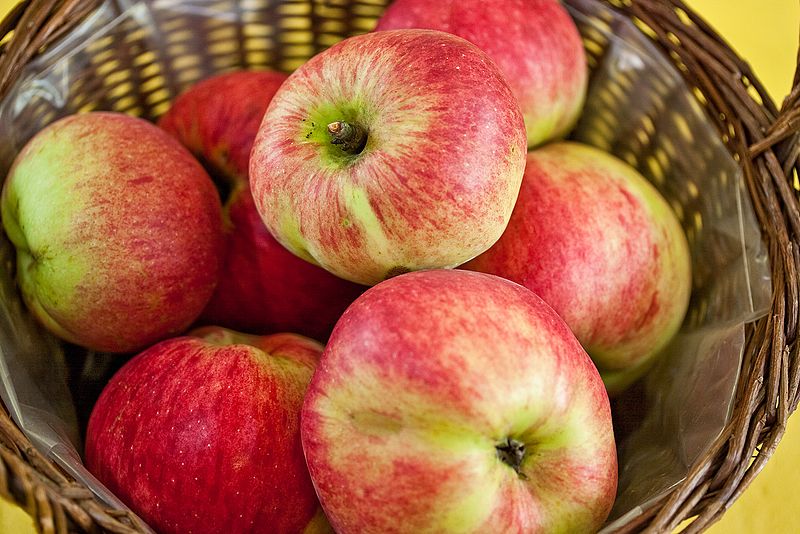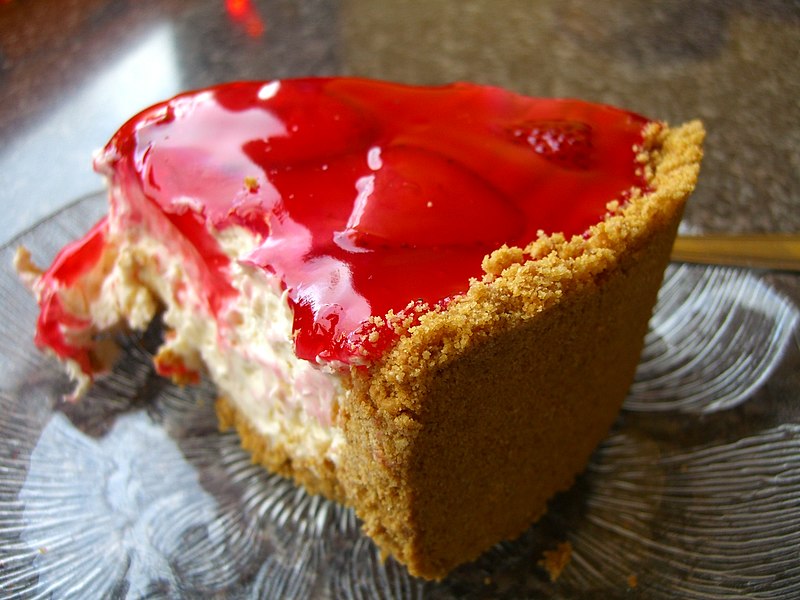Food Related (part 2) / Relacionadas a Comida (parte 2)
Out of the frying pan and into the fire
This is when a situation goes from bad to worse, often when what seemed like a solution to the original problem has been applied and been unsuccessful. Presumably the idea is that being cooked in a fire is (even) worse than being cooked in a frying pan. "So when the shooting started we decided to take shelter in a nearby house, only to find that it was full of armed men, and we had actually walked straight into the terrorists' main base - we went straight out of the frying pan into the fire!"
Isso é quando a situação passa de ruim para pior, frequentemente quando algo parecia ser a solução para o problema original e não foi bem sucedida. Presume-se que ser cozido no fogo é pior que ser frito em uma frigideira. "Então quando o tiroteio começou nós decidimos nos abrigar em uma casa próxima, somente para descobrir que estava cheia de homens armados, e na verdade nós fomos direto para a base principal dos terroristas; fomos direto para fora da frigideira para o fogo!"
Tradução: Fora da frigideira e direto para o fogo.
Isso é quando a situação passa de ruim para pior, frequentemente quando algo parecia ser a solução para o problema original e não foi bem sucedida. Presume-se que ser cozido no fogo é pior que ser frito em uma frigideira. "Então quando o tiroteio começou nós decidimos nos abrigar em uma casa próxima, somente para descobrir que estava cheia de homens armados, e na verdade nós fomos direto para a base principal dos terroristas; fomos direto para fora da frigideira para o fogo!"
Tradução: Fora da frigideira e direto para o fogo.
You can't make an omelet without breaking eggs
Some endeavors have troubles and risks that cannot be avoided but the end results are well worth the trouble (in the opinion of the person using the phrase, which might not be agreed upon by everyone!). "Mike pulled his hamstring in running practice, but you can't make an omelet without breaking eggs."
Alguns empreendimentos têm dificuldades e riscos que não podem ser evitados mas os resultados finais fazem tudo valer a pena (na opinião da pessoa que usou tal frase, que pode não ser a opinião dos outros!). "Mike torceu o tornozelo no treino de corrida, mas você não pode fazer um omelete sem quebrar os ovos".
Tradução: você não pode fazer um omelete sem quebrar os ovos.
Alguns empreendimentos têm dificuldades e riscos que não podem ser evitados mas os resultados finais fazem tudo valer a pena (na opinião da pessoa que usou tal frase, que pode não ser a opinião dos outros!). "Mike torceu o tornozelo no treino de corrida, mas você não pode fazer um omelete sem quebrar os ovos".
Tradução: você não pode fazer um omelete sem quebrar os ovos.
Better than a slap in the face (or belly) with a wet fish
When a person complains about something (or could be expected to complain), another may use this phrase to imply that they are lucky to have what they do, and it could have been much worse. "Jane only won some dog food cans in the raffle, but as I told her, it's better than a slap in the face with a wet fish."
Quando uma pessoa reclama de algo (ou se espera que reclame), outra posse usar essa frase para implicar que são sortudos os que têm o que eles fazem, e poderia ser muito pior. "Jane ganhou latas de comida de cachorro na rifa, mas como lhe disse, é melhor que um tapa na cara com um peixe molhado."
Tradução: melhor que um tapa na cara (ou barriga) com um peixe molhado.
Quando uma pessoa reclama de algo (ou se espera que reclame), outra posse usar essa frase para implicar que são sortudos os que têm o que eles fazem, e poderia ser muito pior. "Jane ganhou latas de comida de cachorro na rifa, mas como lhe disse, é melhor que um tapa na cara com um peixe molhado."
Tradução: melhor que um tapa na cara (ou barriga) com um peixe molhado.
Too many cooks spoil the broth
If too many people try to do the exact same thing at the same time it will most probably ruin the end result.
Se muitas pessoas tentam fazer a mesma coisa ao mesmo tempo, provavelmente vão arruinar o resultado final.
Tradução: Cozinheiros demais estragam a sopa.
Se muitas pessoas tentam fazer a mesma coisa ao mesmo tempo, provavelmente vão arruinar o resultado final.
Tradução: Cozinheiros demais estragam a sopa.
A watched pot never boils
Worrying about a situation and giving it attention (without taking action that is likely to change anything) won't improve it or make it resolve itself any quicker.
Preocupar-se com uma situação e dar-lhe muita atenção (sem tomar atitudes capazes de mudar algo) não melhorarão a situação ou a farão se resolver mais rápido.
Tradução: um pote olhado nunca ferve.
Preocupar-se com uma situação e dar-lhe muita atenção (sem tomar atitudes capazes de mudar algo) não melhorarão a situação ou a farão se resolver mais rápido.
Tradução: um pote olhado nunca ferve.
One bad apple spoils the barrel
If a group of people contains one bad one, this corrupts the group, or may result in such group getting a bad reputation. Sometimes this expression is shortened to "one bad apple", which is generally understood. "After that experience it's not surprising that he hates the police, but you shouldn't judge a whole organization on one bad apple."
Se um grupo de pessoas contém uma ruim, isso corrompe o grupo todo, ou pode resultar em má reputação para tal grupo. Algumas vezes essa expressão é dita dessa forma: "uma maça ruim", que normalmente é entendida. "Depois daquela experiência não é de se surpreender que ele odeia policiais, mas não se deve julgar uma organização por causa de uma maça ruim."
Tradução: uma maça ruim estraga o barril.
Se um grupo de pessoas contém uma ruim, isso corrompe o grupo todo, ou pode resultar em má reputação para tal grupo. Algumas vezes essa expressão é dita dessa forma: "uma maça ruim", que normalmente é entendida. "Depois daquela experiência não é de se surpreender que ele odeia policiais, mas não se deve julgar uma organização por causa de uma maça ruim."
Tradução: uma maça ruim estraga o barril.
The apple of one's eye
 This refers to someone's favorite person, often a child or other relative, or in other contexts a person who is treated with undue favouritism. "Sarah spent all morning at work doing her nails and gossiping, but Steve is the boss there and she's the apple of his eye, so it's no surprise she gets away with it."
This refers to someone's favorite person, often a child or other relative, or in other contexts a person who is treated with undue favouritism. "Sarah spent all morning at work doing her nails and gossiping, but Steve is the boss there and she's the apple of his eye, so it's no surprise she gets away with it."Isso se refere à pessoa preferida de alguém, frequentemente uma criança ou algum parente, ou em outro contexto uma pessoa que é tratada com favorecimento. "Sarah passou a manhã toda no trabalho fazendo as unhas e fofocando, mas Steve é o chefe de lá e ela é a maça dos olhos dele, então não é de se surpreender que ela escapa de reprimendas."
Tradução: a maça dos olhos de alguém.
The carrot and stick (approach)
This is when someone threatens (or implies a threat) and bribes a person at the same time to get them to do what they want to. This is probably based on the old idea that a donkey can be persuaded to move by dangling a carrot in front of its nose which it hopes to eat, and having a stick in reserve to hit or poke it with if it still refuses, for additional encouragement. "I'm using the carrot and stick approach with Cheryl; I praise her when she does her homework, even when she gets it wrong, and when she doesn't do it or makes excuses, I remind her that I will be discussing this with her parents later."
Isso é quando alguém ameaça (ou deixa a ameaça subentendida) e suborna alguém ao mesmo tempo para que façam algo. É provavelmente baseado na ideia de que um burro será convencido a se mover se alguém pendurar uma cenoura na frente de seu nariz e aquele quer pegá-la, e ter um pau de reserva para bater ou cutucar-lhe se ainda assim se recusa, para encorajamento adicional. "Estou usando o método da vara e cenoura com Cheryl; lhe recompenso quando ela faz o dever de casa, mesmo se ela erra, e se ela não o faz ou inventa desculpas, eu a lembro que irei contar para seus pais".
Tradução: (o método d)a cenoura e (d)a vara.
Isso é quando alguém ameaça (ou deixa a ameaça subentendida) e suborna alguém ao mesmo tempo para que façam algo. É provavelmente baseado na ideia de que um burro será convencido a se mover se alguém pendurar uma cenoura na frente de seu nariz e aquele quer pegá-la, e ter um pau de reserva para bater ou cutucar-lhe se ainda assim se recusa, para encorajamento adicional. "Estou usando o método da vara e cenoura com Cheryl; lhe recompenso quando ela faz o dever de casa, mesmo se ela erra, e se ela não o faz ou inventa desculpas, eu a lembro que irei contar para seus pais".
Tradução: (o método d)a cenoura e (d)a vara.
To have one's cake and eat it (too)
This is when a person wants the advantages of something without paying the price which it entails. The use of "have" in this phrase is a little unusual, and it would more conventionally be expressed as "keep", as the phrase literally means that a person is wanting both to keep their cake and to consume it, an obviously impossible contradiction. "He thinks that because he's been getting paid so long for doing the bare minimum that a promotion is still going to come down some day, but you can't have your cake and eat it too."
Isso é quando alguém quer as vantagens de algo sem pagar-lhe o preço. O uso da palavra "have" (ter) nessa frase não é usual, e é equivalente a "keep" (manter), eis que a frase significa literalmente que uma pessoa quer manter o bolo e o consumir, obviamente uma contradição. "Ele pensa que por ter trabalhado tanto tempo fazendo o mínimo possível ainda será promovido, mas não é possível manter o bolo e come-lo também."
Tradução: manter o bolo e come-lo (também).
Isso é quando alguém quer as vantagens de algo sem pagar-lhe o preço. O uso da palavra "have" (ter) nessa frase não é usual, e é equivalente a "keep" (manter), eis que a frase significa literalmente que uma pessoa quer manter o bolo e o consumir, obviamente uma contradição. "Ele pensa que por ter trabalhado tanto tempo fazendo o mínimo possível ainda será promovido, mas não é possível manter o bolo e come-lo também."
Tradução: manter o bolo e come-lo (também).

Nenhum comentário:
Postar um comentário
Comentários são bem vindos / Comments are appreciated!